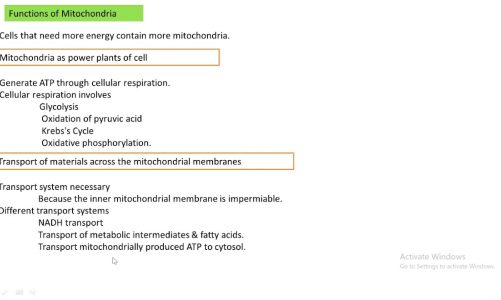#Mitochondria are organelles found in the cells of all living organisms.
They are responsible for generating most of the cell’s energy, which is used for cellular processes such as metabolism, muscle contraction, and cell signalling.
Mitochondria are made up of two membranes: an outer membrane and an inner membrane. The inner membrane is folded into cristae, which increase the surface area of the membrane and allow for more efficient energy production.
The mitochondria’s inner membrane contains the electron transport chain, which is a series of proteins that transfer electrons from food molecules to oxygen. This process releases energy, which is used to create adenosine triphosphate (ATP), the cell’s main energy molecule.
Mitochondria are also involved in other cellular processes, such as calcium signalling, apoptosis (programmed cell death), and heat production.
Dietary and lifestyle choices can have a significant impact on mitochondrial health. Some of the positive choices include:
Eating a healthy diet that is rich in antioxidants.
1. Eggs, Meat, Fatty fish, such as salmon and tuna,
2. Avocados
3. Nuts and seeds
4. Olive oil
5. Dark chocolate
6. Green leafy vegetables & Cruciferous vegetables, such as broccoli and Brussels sprouts
7. Fermented foods, such as yogurt and sauerkraut
Some of the negative choices include:
1. Eating a diet that is high in processed foods, sugar, fructose, and unhealthy fats like industrially manufactured seed oils high in omega 6.
2. Being overweight or obese.
3. Having chronic diseases, such as diabetes and heart disease.
4. Exposure to environmental toxins, such as heavy metals and pollutants.
Here are some specific nutrients that are important for mitochondrial health:
Antioxidants: Antioxidants help to protect mitochondria from damage caused by free radicals. Good sources of antioxidants include fruits, vegetables, nuts, and seeds.
Coenzyme Q10: Coenzyme Q10 is a powerful antioxidant that is found in mitochondria. It is also involved in energy production. Good sources of coenzyme Q10 include beef, sardines, and peanuts.
L-carnitine: L-carnitine is an amino acid that helps to transport fatty acids into mitochondria for energy production. Good sources of L-carnitine include beef, chicken, and fish.
Magnesium: Magnesium is a mineral that is essential for many cellular processes, including mitochondrial function. Good sources of magnesium include leafy green vegetables, nuts, and seeds.
Riboflavin (vitamin B2): Riboflavin is a cofactor for the electron transport chain, and it is also involved in energy production. Good sources of riboflavin include dairy products, leafy green vegetables, and beans.
Niacin (vitamin B3): Niacin is also a cofactor for the electron transport chain, and it is involved in energy production. Good sources of niacin include meat, poultry, fish, and whole grains.
Folate: Folate is a B vitamin that is involved in DNA synthesis and repair. It is also important for mitochondrial function. Good sources of folate include leafy green vegetables, citrus fruits, and beans.
Zinc: Zinc is a mineral that is involved in many cellular processes, including mitochondrial function. Good sources of zinc include meat, poultry, fish, and nuts.
Selenium: Selenium is an antioxidant that helps to protect mitochondria from damage. Good sources of selenium include seafood, Brazil nuts, and poultry.
Here are some additional tips for improving mitochondrial health:
1. Get regular exercise. Exercise helps to increase the number of mitochondria in your cells and improve their function.
2. Manage stress. Stress can damage mitochondria, so it is important to find ways to manage stress, such as yoga, meditation, or spending time in nature.
3. Get enough sleep. Sleep is essential for mitochondrial health. When you sleep, your body repairs damage to mitochondria and produces new ones.
4. Avoid smoking and excessive alcohol consumption. Smoking and excessive alcohol consumption can damage mitochondria.
5. Protect yourself from environmental toxins. Exposure to environmental toxins, such as heavy metals and pollutants, can damage mitochondria.
The 5 AM Club is a self-help book that argues that waking up at 5am and using the first hour of your day for self-improvement can help you achieve your goals and live a more fulfilling life.
https://www.amazon.com/The-5-AM-Club-Robin-Sharma-audiobook/dp/B07KRM53PR/ref=sr_1_1?crid=119KQMZXXX7LV&keywords=5+am+club&qid=1694332639&sprefix=5+am+club%2Caps%2C226&sr=8-1
source



